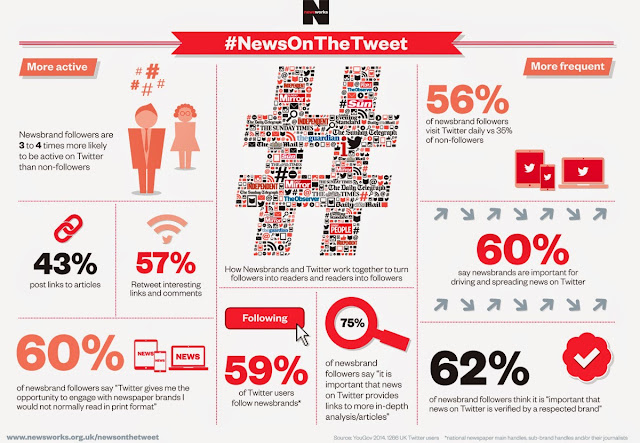News on the Tweet
News on the Tweet is a report from Newsworks (a marketing organisation representing newspapers) and Twitter designed to show the positive impact new and digital media can have on traditional media.

Read the report and answer the questions on your blog. Include the News on the Tweet infographic above in your blogpost.

Read the report and answer the questions on your blog. Include the News on the Tweet infographic above in your blogpost.
- Why are respected news brands good news for Twitter?
- Why in turn is Twitter good for respected news brands?
- The report suggests that old and new media “are not, in fact, in direct competition, but often work extremely well together to enhance both the media eco-system and the consumer experience”. What evidence do they provide to support this idea? Do you agree with it?
- On page 24/25 of the report, the focus turns to 'gossip' or 'banter'. What example tweets from journalists are used to illustrate this?
Dan Wootton- "Red carpet awks moment from last night as microphone chord gets stuck to @KlassMyleene's dress"
- Do you think the increasing amount of 'gossip' or 'banter' is harming the reputation of news and journalists?
Yes because it essentially turns newspapers into tabloids about celebrities and scandals, rather tan providing audiences with news, which is essential. Although "gossip and banter" is acceptable to some extent as it provides audiences with entertainment, however newspapers are intended to provide us with news on current events in the world. If news organisation provide more content on celebs, they can be discredited and seen as unreliable in providing audiences with good quality content. A recent example of this would be the BBC website- it is now filled with funny videos and unusual stories, rather than global news.
- What does the report say about trust in Twitter and journalists (look at pages 34-39)?
45% of Twitter users say that it is important that news on Twitter is verified by a respected brand- as it makes it more trustworthy. 39% of journalists on Twitter are a trustworthy, faster source of news. Overall, journalists create entertainment and engagement through their regular tweets and drive traffic and interaction, which raises their profiles as well as the news brand.
- Do you think new and digital media developments such as Twitter have had a positive or negative impact on traditional newspapers?
I think that new developments have had a positive impact on traditional newspapers as the online platform allows the news brand to gain recognition and credibility. News brands bring "trust, access to deeper analysis and expert opinion" as well as content that connects communities of like minded people. Meanwhile, Twitter, offers instant access to a range of news brands, journalists, and content that wold not have been explored previously.
- Finally, how can we link this report to the vital current debate regarding fake news and Facebook? Do traditional news brands need protecting to ensure there are sources we can trust?
This report links to fake news as it provides evidence on how there are still trustworthy news organisations that dominate mainstream media, which provide us with reliable content. However with this in mind it is crucial that we protect these brands to ensure that we are being shown accurate content amongst a large amount of fake news that we see today. Major online companies such as Google and Facebook need to filter out fake news by posting ads or content that is verified and published by news organisations sch as The Guardian, which deem themselves as reliable and accurate and able to provide good quality investigative journalism.
Comments
Post a Comment